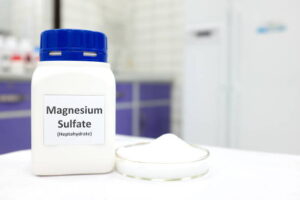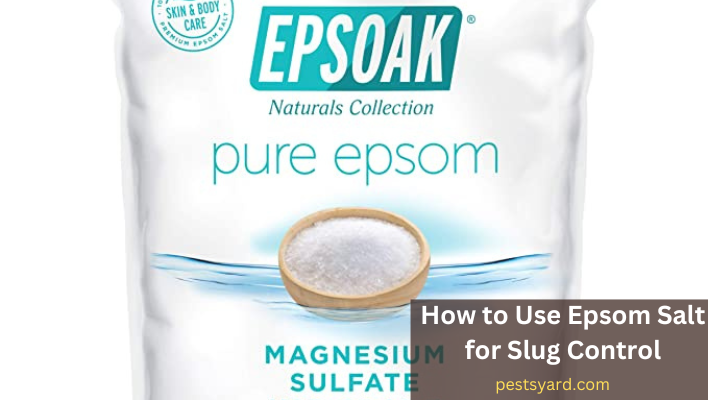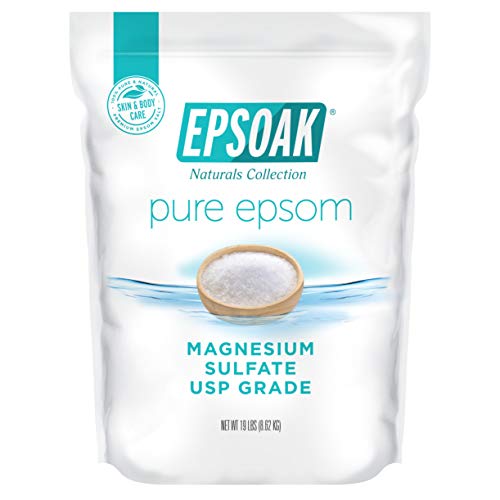Many people are afraid to use toxic chemicals in their yards because of the potential harm it may cause to themselves and/or any pets in the house. Fortunately, there is a safe and natural way to get rid of slugs without harming your family, pets, and plants, which is using Epsom salt to control pesky slugs.
Epsom salt is one of the easiest and most inexpensive ways to keep slugs at bay. The best way to use Epsom salt for slug control is to sprinkle it around your plants, flowers, and vegetables. This will provide a barrier between them and any slugs hoping to munch on your crops.
So, if you’re a gardener and have a slug problem in your garden, Epsom salt is the answer. The salt is great at killing slugs because it dehydrates them. Some people even believe adding a little Epsom salt to their garden soil encourages or speeds up the growth of plants.
About Epsom Salt
Epsom salt is a mineral naturally occurring on the earth and has proven useful for plants. It can help them grow faster, better, and stronger. It has also been used since ancient times to treat burns and rashes on the skin and is also known to help relieve muscle pain and stiffness.
Epsom salt has many uses in the home and garden and can be used as a plant fertilizer. It’s commonly used on plants for its ability to promote growth and leaf color, as well as for its ability to improve plant health by increasing the efficiency of photosynthesis.
However, experts have recommended it as an additive to soil because it increases the soil’s pH level, making it more alkaline. The increased alkalinity helps with the absorption of nutrients by the plant and also helps prevent disease.
You can sprinkle Epsom salt on top of the soil before planting or mix it into your soil after planting. You can also use Epsom salt to help clean up spilled spills on the ground or sidewalks around your house.
Sprinkling Epsom salt around your plants will also protect them from slugs and snails as it contains a chemical compound with positively charged ions harmful to slugs and snails. When salt touches slugs, it causes dehydration which leads to their death.
How Epson salt works on slugs
Epson salt is a very effective slugs killer. It’s a type of salt used to kill slugs, snails, and other pests. It’s easy to use, and it doesn’t cost much.
It is a natural, non-toxic way to eliminate slugs. It contains magnesium and sulfur, which are essential for plant growth. When you use it to treat slugs, it helps kill them by dehydrating them.
You can buy Epson salt at most home improvement stores or garden centers. Epson salt works on slugs because the salt is designed to draw moisture from the slug’s body. You can sprinkle or mix the salt in water. Epson salts are available in two forms: granular and liquid, and both work equally well.
It is safe for the environment, pets, and people if accidentally ingested (it won’t hurt them). It’s also effective against sowbugs and other pests like chiggers and ticks. Here’s how Epson salt works on slugs:
- It kills the slug by dehydrating them and killing them by suffocation.
- It dehydrates the slug by drawing moisture out of their tissues, which causes them to shrivel up into an almost paper-like state.
It’s best to use Epsom salt when you notice that there are slugs in your garden or on your lawn. You can also sprinkle the Epsom salt on the ground around your plants to kill and keep them away.
The best part about this method is that it will work quickly; in just a few days, you’ll probably notice a reduction in slug populations.
- Epsoak Epsom Salt (Magnesium Sulfate) is USP grade. It is GMO free (Genetically Modified Organism).
- After soaking in Epsoak Epsom Salt it becomes clear why Epsoak is the leading name in Epsom Salt. The expertly selected grain size of Epsoak Epsom Salt means that it dissolves quickly & easily in warm water without hassle every single time. It's transparent/slightly white in color, and is unscented. Buy in BULK and save.
- Known for its amazing therapeutic qualities, an epsom salt bath can help to relieve muscle aches and pains, relieve aching feet, cleanse pores, flush out toxins, detoxify the skin. Mix with shower gel to create your own body scrub.
How to use Epsom salt on slugs
Epsom salt is a great way to help get rid of slugs. Here are some awesome ways to use Epsom salt to get rid of slugs:
- Add a cup of Epsom salt to your compost pile and let it sit for four weeks. The slugs will eat it, and you can remove the slug bodies from your garden.
- Add Epsom salt to a spray bottle and fill it with water. Spray the mixture all over the garden, including under plants and in grassy areas where slugs might be hiding.
- Use a mixture of 1 cup of Epsom salt, 1 gallon of water, and 1 teaspoon of dish soap. Soak your plants in this solution for at least 30 minutes to kill slugs. You can also use this on your lawn or garden as needed.
- Sprinkle Epsom salt around the base of plants where slugs are likely to be hiding out, like around the edges of pots or the outer edges of your garden beds.
- Mix one tablespoon of hot pepper sauce with 1 tablespoon of Epsom salt and apply it directly onto the slug’s shell until it softens up significantly, then clean up the slime trail left behind by the slug with a hose or broom handle. This works best when applied within 24 hours after noticing signs of slugs in your yard.
- Keep a bowl of Epsom salt handy so that when you find slugs, you can quickly sprinkle some on them and watch them die.
How to make Epsom salt spray
Epsom salt spray is a natural way to kill slugs. It’s easy to make, you don’t need any special equipment, and it only takes a few minutes.
You’ll need:
- 1 cup of Epsom salt
- 1 gallon of water
- 2 teaspoons of dish soap (optional)
Here’s how to do it:
-
- Mix your Epsom salt and the water in a bucket or bowl. The mixture should be about as thick as pancake batter. If it’s too thick, add more water; if it’s too thin, add more Epsom salt. Stir in your dish soap (if using).
- Pour the mixture into a spray bottle with a spray nozzle.
- Spray on any area where slugs might be hiding! You can also use this method to treat an entire yard or garden area before the planting season starts again in the springtime.
Can I sprinkle Epsom salt around plants?
When sprinkled on soil, Epsom salt can help you to grow better plants and maintain healthy soil. So, yes, you can sprinkle Epsom salt around plants.
Epsom salts are a natural mineral that contains magnesium and sulfate. When you sprinkle Epsom salt around plants, you add essential minerals to their soil. These minerals help the plant absorb nutrients from the soil, which makes it easier for them to grow and thrive.
If you’re planting seeds, Epsom salt can help them sprout faster by increasing their moisture requirements. If you’re planting bulbs or other root vegetables, Epsom salt can help them grow deeper roots.
In addition to adding essential nutrients to the soil, Epsom salts also improve plant growth by removing toxins from your garden or lawn. Using Epsom salts as fertilizer, you’ll be able to rid your plants of weed seeds and other harmful substances without using chemicals or other dangerous substances on your property.
However, using too much Epsom salt around your plants can be dangerous as it burns their roots and causes your plants to die.
How to apply Epsom salt to plants
When you’re trying to grow plants, it’s important to know how to apply Epsom salt to your plants. The best option for growing plants is to use Epsom salt as fertilizer.
Epsom salt comes in two forms: liquid and granular. You can use either form, but if you want to be safe, use the liquid version.
The best way to apply Epsom salt is by sprinkling it on top of the soil around your plants. Make sure you don’t do this too often or too heavily because it can burn the roots of your plants. You should also ensure that you have enough water available for your plant so that it doesn’t die from lack of water due to too much Epsom salt being applied around its roots (this could lead to disease).
If you use too much Epsom salt, layer it with something like compost or potting soil so that there won’t be too much contact between the Epsom salt and your plant’s root system (this will help prevent burns that may occur if there isn’t enough ventilation around the roots).
The amount of time between application intervals will depend on how quickly your plants grow (they usually require. Epsom salt is an excellent fertilizer for plants. It can be used to water your garden, or you can use it as a soil amendment.
Here’s how to apply Epsom salt to plants:
-
-
- Fill a spray bottle with two tablespoons of Epsom salts with one gallon of water. Add this mixture to your watering can and spray the top layer of soil in your garden, on top of your potting mix, or on top of the leaves of plants, you want to fertilize. (You can also add this mixture directly to your potting mix.)
- Repeat this step once a week until the leaves stop wilting from lack of water (if they are wilting in any other way). The salt will help feed the roots, making them less likely to die when they run out of nutrients.
-
What plants don’t like Epsom Salt?
You must be wary of some plants using Epsom salt to deter and kill slugs in your garden. These plants may not need the component of Epsom salt, which is calcium sulfate. So you have to watch out for these plants to avoid killing them while trying to save them from slugs.
Plants aren’t used to being exposed to chemical substances and are especially sensitive to mineral salts. In an effort to protect their roots, plants will often develop a defense mechanism called osmosis. This natural process allows plants to absorb water and nutrients through their root system.
The problem with using Epsom Salt as a fertilizer is that it causes the plant’s roots to swell, which prevents them from absorbing nutrients through osmosis. If you’ve ever seen a plant go “slug-like” after being watered with Epsom Salt, you know what I’m talking about. Epsom salt can be toxic to many plants, including:
- Roses
- Vines and climbing plants (like ivy, grapes, and bamboo)
- Lilies
- Geraniums
- Chrysanthemums
- Mosses
- Ferns
- Dryopteris
- Rhododendron
- Jade
- Orchids
These Plants don’t like Epsom salt because it’s a crystalline substance that can penetrate plant cells and extract nutrients. It can also cause damage to the root system, causing the plant to wilt or die.

Other Pests to use Epson salt
Aside from killing slugs and helping your plants grow, you can also use slugs to keep some pesky pests away from your garden; this makes Epsom salt a necessary home product.
Epsom salt will kill ants.
Yes, Epsom salt is an effective way to kill ants. It is an alkaline solution used to clean your home or property, making it a great choice for pest control.
To use Epsom salt as an ant killer, mix two tablespoons of Epsom salts per gallon of water and spray the solution around your home and garden. You can also sprinkle it around where you’ve noticed ants are coming up from the ground and leave it there for several days until they all die off.
Epsom salt will kill maggots and worms.
Epsom salt will kill maggots, worms, and many segmented pests. It is a natural household remedy used to remove stains and odors, and a few drops placed in a sock can effectively kill most mildew problems in your laundry room or basement.
This salt effectively kills many insects, including flies, worms, and maggots. However, it does not kill all types of unwanted pests. The worm found in wasp nests is an example of an insect unaffected by Epsom salt.
Maggots can harm the new hive and cause it to fall apart. Removing larvae, pupae, and adult moths from hives with Epsom salt is good practice once every two weeks.
Epsom salt kills aphids.
When you find honeydew, aphids, and mold on your plants, or when you notice leaves of your tomato or basil turning yellow or curling, there is a good chance that they are infested with the common pest problem of the slug.
Epsom salt is used to help kill aphids and small (flat) insects that can damage plants and transmit diseases. Although it may take some time to be effective, monitor your plants carefully until then.
Sprinkle some around the plants, and the new buds will flourish. It also gets rid of other pests, like spider mites and whiteflies. You can also water and spray your garden to kill aphids and other flats insects.
Use a small amount of Epsom salt solution at a time, as too much injures your plants. Follow the instructions on the package to treat individual plants carefully; do not treat more than 100 square feet of garden area at one time if you use this product in your landscape.
Epsom salt kills termites.
Epsom salt is an excellent way to kill termites. The salt’s high concentration of magnesium and sulfate ions is attractive to termites, but its high pH level makes it toxic.
Termites have a natural aversion to the mineral content of Epsom salt, which is why it’s so effective. Sprinkle some Epsom salt around the perimeter of your home, and let it sit for a few days. The termites will be unable to find their way into your home and die trying to get there.
If you have a problem with termites, use a mild detergent solution or water with Epsom salt added and spray directly into their colony. You can also apply some of this solution onto your lawn and leave it overnight before raking up any dead insects.
This method is effective but time-consuming; if you have a large infestation, you’ll need to repeat this process several times for weeks or months.
Other uses of Epsom salt in the garden
Epsom salt is an all-natural, organic product used for centuries in the garden. It’s also great to boost your plants’ immune systems and keep them healthy, so you don’t have to worry about pests or diseases attacking them.
Epsom salt can help improve the health of a garden. This can be achieved by using magnesium sulfate or magnesium chloride, which helps create an acidic environment that lowers the ph level in the soil of vines and other plants. Applying correctly will help prevent diseases such as mildew and plant leaf spots.
Some of the most common uses of Epsom salt in the garden include:
-
- Improving soil quality: Epsom salt helps to enhance soil quality by absorbing excess salts, making it easier for plants to absorb nutrients from the soil.
- Boosting plant health: Epsom salt can help boost plant health by increasing plant nutrient uptake. To use it as an everyday fertilizer, sprinkle some around the base of young plants or older ones where growth has stopped or slowed down.
- Fertilizing flowers: Sprinkle a little Epsom salt on flower petals before planting them in containers or hanging baskets, which will help their colors stay vibrant and attractive throughout spring and summertime.
- Preventing insects from eating plants
- Epsom salt can also treat common weeds in your yard, like chickweed or dandelions. You can sprinkle it on top of the soil where the weeds grow, mix it with water, and spray it on your plants as they need extra nutrients.
- Epsom salt can be used as a plant tonic, an amazing way to improve the growth of young plants and flowers. It can be sprinkled on the soil around newly planted seeds or used as a liquid fertilizer added to the soils around your existing plants. As you probably know, Epsom salt primarily consists of magnesium and sulfur, essential plant nutrients.
- Epsom salt is frequently used in the garden to soften hard water and create an alkaline soil. Adding Epsom salt to your garden will help prevent soil from becoming too hard, slowing down certain root growths, and developing solid roots for healthy plants.


